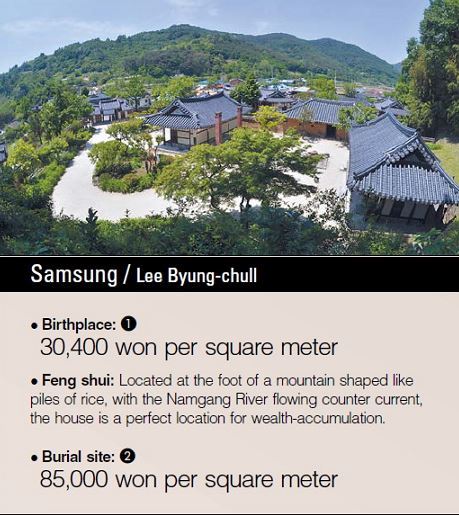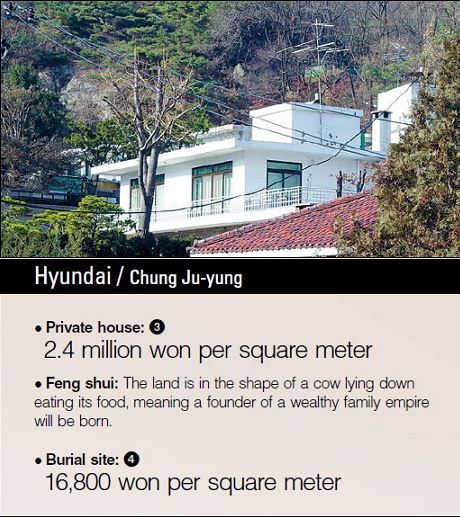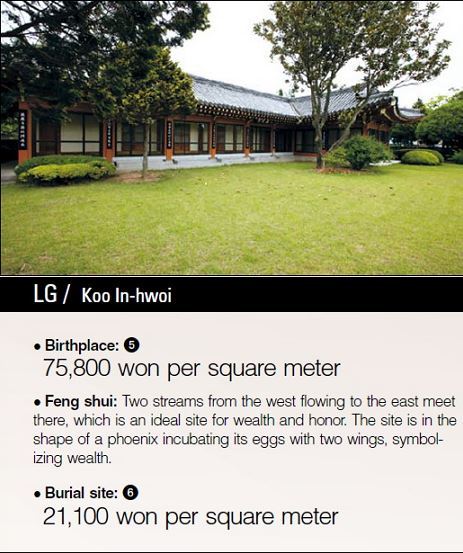Feng shui can be laughed off as mere superstition in today’s highly advanced society.
Still, some of the wealthiest people in South Korea believe that it helps them not only find peace and fortune, but also intentionally select the best land so that they and their ancestors can feel the qi, or energy.
Coincidence or not, many superrich attempt to practice good feng shui.

Tens of thousands of people wanting to feel good qi make pilgrimages to the birthplaces of conglomerate founders, while some superrich or those who wish to be rich secretly compete for the best burial sites according to feng shui.
Some even move graveyards to follow this ancient art and science.
The Korea Herald Special Investigative Team has studied the feng shui of birthplaces and burial sites of the richest business tycoons in the country.
While not to be taken too seriously, many wealthy people follow feng shui out of respect for the ancestors of business empires.

Samsung
Samsung Group founder Lee Byung-chull was born and raised in Uiryeong, South Gyeongsang Province.
Dubbed one of the most auspicious locations in Korea, Lee’s birthplace is located at the foot of Mount Jirisan, with the mountain range stretching out behind the house. This mountain range, with the hidden energy of the dragon, is said to act as a fence to the house, according to “Feng-Shui & Architecture of Korea” by Park Si-ik.
The Lee clan seemed to have been aware of the good location, building the traditional Korean house facing the southwestern direction instead of the conventional north, in order to receive the full energy of the dragon.
“There is a mountain in the back and a river in the front of the house, a classic ideal site in feng shui,” a house manager said.
Yongin in Gyeonggi Province, where Lee was buried in 1987, is known as the best for the dead due to its fertile soil. Owned by current chairman and Byung-chull’s third son Lee Kun-hee, this 5.7-square-kilometer plot is valued at up to 2.5 million won ($2,410) per 3.3 square meters.
Hyundai
The late Chung Ju-yung, the founder of Hyundai Group, spent most of his life in the Jongno district of Seoul.
In the area resembling the shape of a cow laid down to eat, those who live here are said to bear great men who will run the country and will be wealthy for generations, feng shui experts say. Thanks to Mount Bukhansan spreading out westward and southward, the place also holds vitality from the energy of the dragon.

The price of this 905-square-meter lot, which was first registered by Chung in 1961 and later inherited by Hyundai Motor Group chairman Chung Mong-koo in 2001, has quadrupled over more than 20 years to 2.4 million won per square meter.
The late Chung’s grave is located at the foot of Mount Geomdansan in Gyeonggi Province. The family-size cemetery plot is about 330 square meters. The place is said to have shade in the morning and sunlight from midday until sunset as if to keep its tranquility.
SK
The birthplace of Choi Jong-kun, founder and former chairman of SK Group, in Suwon, Gyeonggi Province, is said to be the place where rich people are born because the yang energy spreads across the house along with yin energy, which symbolizes purse strings.
The land, currently owned by SKC chairman Choi Shin-won, is 945,000 won per square meter, having increased fivefold since 1990.
The family burial site for SK Group in Hwaseong, Gyeonggi Province, also boasts good feng shui.
The burial site of Choi’s father is said to be a spot that produces rich descendants. This may have become the very background for Choi’s efforts in SK today.
However, the great qi failed to protect SK chairman Chey Tae-won from being put behind bars for embezzlement and influence-peddling charges in 2012.

LG
A village in Jinju, South Gyeongsang Province, where Koo In-hoe, founder and former chairman of LG, was born, is said to be an ideal site for wealth and honor. In feng shui, water symbolizes wealth and two streams meet at the site.
The property has been owned by current chairman Koo Bon-moo since 2006, and its land price has tripled to 78,200 won per square meter over 24 years.
The late Koo’s grave in Dongnae-gu, Busan, is also evaluated as a good burial site because Dongnae-gu is said to bear the knowledge and virtue of Busan.
Lotte
Shin Kyuk-ho, founder and chairman of Lotte, is the last living business tycoon from the original top five.
His hometown no longer exists ― it was submerged after a dam was constructed nearby in 1969.
But right across from his submerged birthplace in Ulsan, South Gyeongsang Province, he created a new village, including a villa, a newly restored house and Town Hall.
The village may be isolated, but its real estate price begs to differ. The 1,352-square-meter site, which Shin left to his two sons, is currently valued at 117,000 won per square meter, its value quadrupling over 15 years.
Doosan
Not all ideal sites are naturally made, according to Qingwujing, a Chinese classic on the study of feng shui.
The place where the late Park Too-pyong, former chairman of Doosan Group, was born is said to be manmade because of a large pond in Yeonji-dong, Jongno-gu, Seoul. The pond was built during the Joseon era (1392-1910) based on feng shui to block the force of fire in the area.
The place, currently owned by the Doosan Yonkang Foundation and where Doosan Art Center is built, has a land price that has surged to 10.2 million won per square meter from 3.5 million won in 1990.
The Doosan family burial site in Gwangju, Gyeonggi Province, is set in a 12,694-square-meter forest owned by Doosan Heavy Industries & Construction chairman Park Yong-sung.
By Korea Herald Special Investigative Team
(hjlee0301@heraldcorp.com)
Kwon Nam-keun
Hong Seung-wan
Sung Yeon-jin
Bae Ji-sook
Yoon Hyun-jong
Min Sang-seek
Kim Hyun-il
Lee Hee-ju
Still, some of the wealthiest people in South Korea believe that it helps them not only find peace and fortune, but also intentionally select the best land so that they and their ancestors can feel the qi, or energy.
Coincidence or not, many superrich attempt to practice good feng shui.

Tens of thousands of people wanting to feel good qi make pilgrimages to the birthplaces of conglomerate founders, while some superrich or those who wish to be rich secretly compete for the best burial sites according to feng shui.
Some even move graveyards to follow this ancient art and science.
The Korea Herald Special Investigative Team has studied the feng shui of birthplaces and burial sites of the richest business tycoons in the country.
While not to be taken too seriously, many wealthy people follow feng shui out of respect for the ancestors of business empires.

Samsung
Samsung Group founder Lee Byung-chull was born and raised in Uiryeong, South Gyeongsang Province.
Dubbed one of the most auspicious locations in Korea, Lee’s birthplace is located at the foot of Mount Jirisan, with the mountain range stretching out behind the house. This mountain range, with the hidden energy of the dragon, is said to act as a fence to the house, according to “Feng-Shui & Architecture of Korea” by Park Si-ik.
The Lee clan seemed to have been aware of the good location, building the traditional Korean house facing the southwestern direction instead of the conventional north, in order to receive the full energy of the dragon.
“There is a mountain in the back and a river in the front of the house, a classic ideal site in feng shui,” a house manager said.
Yongin in Gyeonggi Province, where Lee was buried in 1987, is known as the best for the dead due to its fertile soil. Owned by current chairman and Byung-chull’s third son Lee Kun-hee, this 5.7-square-kilometer plot is valued at up to 2.5 million won ($2,410) per 3.3 square meters.
Hyundai
The late Chung Ju-yung, the founder of Hyundai Group, spent most of his life in the Jongno district of Seoul.
In the area resembling the shape of a cow laid down to eat, those who live here are said to bear great men who will run the country and will be wealthy for generations, feng shui experts say. Thanks to Mount Bukhansan spreading out westward and southward, the place also holds vitality from the energy of the dragon.

The price of this 905-square-meter lot, which was first registered by Chung in 1961 and later inherited by Hyundai Motor Group chairman Chung Mong-koo in 2001, has quadrupled over more than 20 years to 2.4 million won per square meter.
The late Chung’s grave is located at the foot of Mount Geomdansan in Gyeonggi Province. The family-size cemetery plot is about 330 square meters. The place is said to have shade in the morning and sunlight from midday until sunset as if to keep its tranquility.
SK
The birthplace of Choi Jong-kun, founder and former chairman of SK Group, in Suwon, Gyeonggi Province, is said to be the place where rich people are born because the yang energy spreads across the house along with yin energy, which symbolizes purse strings.
The land, currently owned by SKC chairman Choi Shin-won, is 945,000 won per square meter, having increased fivefold since 1990.
The family burial site for SK Group in Hwaseong, Gyeonggi Province, also boasts good feng shui.
The burial site of Choi’s father is said to be a spot that produces rich descendants. This may have become the very background for Choi’s efforts in SK today.
However, the great qi failed to protect SK chairman Chey Tae-won from being put behind bars for embezzlement and influence-peddling charges in 2012.

LG
A village in Jinju, South Gyeongsang Province, where Koo In-hoe, founder and former chairman of LG, was born, is said to be an ideal site for wealth and honor. In feng shui, water symbolizes wealth and two streams meet at the site.
The property has been owned by current chairman Koo Bon-moo since 2006, and its land price has tripled to 78,200 won per square meter over 24 years.
The late Koo’s grave in Dongnae-gu, Busan, is also evaluated as a good burial site because Dongnae-gu is said to bear the knowledge and virtue of Busan.
Lotte
Shin Kyuk-ho, founder and chairman of Lotte, is the last living business tycoon from the original top five.
His hometown no longer exists ― it was submerged after a dam was constructed nearby in 1969.
But right across from his submerged birthplace in Ulsan, South Gyeongsang Province, he created a new village, including a villa, a newly restored house and Town Hall.
The village may be isolated, but its real estate price begs to differ. The 1,352-square-meter site, which Shin left to his two sons, is currently valued at 117,000 won per square meter, its value quadrupling over 15 years.
Doosan
Not all ideal sites are naturally made, according to Qingwujing, a Chinese classic on the study of feng shui.
The place where the late Park Too-pyong, former chairman of Doosan Group, was born is said to be manmade because of a large pond in Yeonji-dong, Jongno-gu, Seoul. The pond was built during the Joseon era (1392-1910) based on feng shui to block the force of fire in the area.
The place, currently owned by the Doosan Yonkang Foundation and where Doosan Art Center is built, has a land price that has surged to 10.2 million won per square meter from 3.5 million won in 1990.
The Doosan family burial site in Gwangju, Gyeonggi Province, is set in a 12,694-square-meter forest owned by Doosan Heavy Industries & Construction chairman Park Yong-sung.
By Korea Herald Special Investigative Team
(hjlee0301@heraldcorp.com)
Kwon Nam-keun
Hong Seung-wan
Sung Yeon-jin
Bae Ji-sook
Yoon Hyun-jong
Min Sang-seek
Kim Hyun-il
Lee Hee-ju
-
Articles by Korea Herald




![[Herald Interview] 'Amid aging population, Korea to invite more young professionals from overseas'](http://res.heraldm.com/phpwas/restmb_idxmake.php?idx=644&simg=/content/image/2024/04/24/20240424050844_0.jpg&u=20240424200058)












![[KH Explains] Korean shipbuilding stocks rally: Real growth or bubble?](http://res.heraldm.com/phpwas/restmb_idxmake.php?idx=652&simg=/content/image/2024/04/25/20240425050656_0.jpg&u=)

